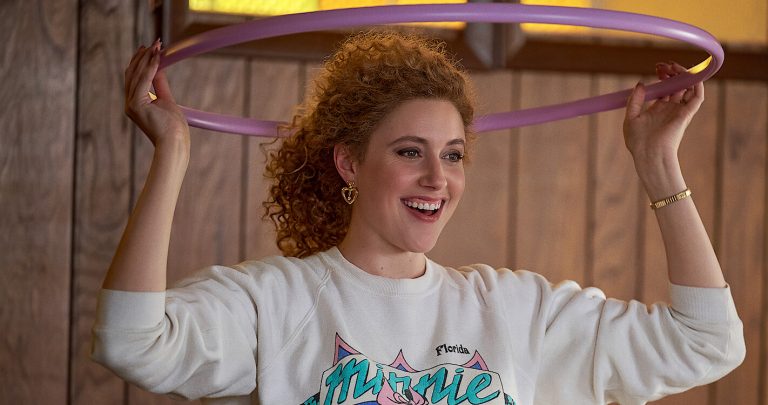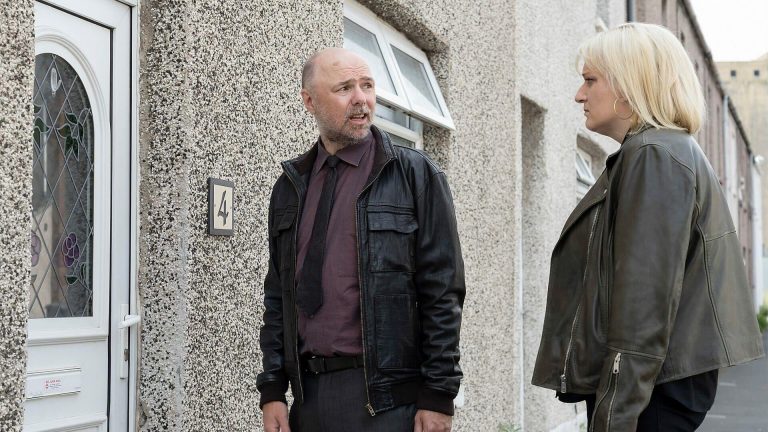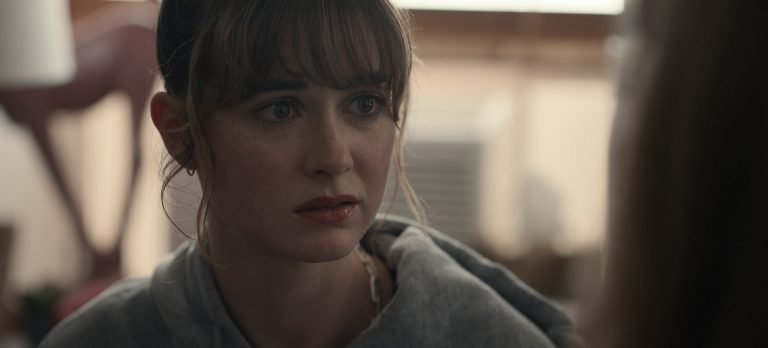Dave (Season 3), Episodes 5 & 6: While it was always nice that this season of DAVE had a single throughline, it was always time for a changeup. It’s also ironic that as much as we want Dave to change and become a functional human being, the USP of the show has always been the weird hijinks Dave or his family and friends inadvertently get stuck into, or even advertently due to Dave’s own big mouth. In fact, that’s precisely what happens in both Episodes 5 & 6.
Dave (Season 3), Episodes 5 & 6 Recap:
Episode 5 – The Storm
It begins with Meg (Megan Ehrlich), a Li’l Dicky fan whose dreams come true when she is called up to the stage by Li’l Dicky himself in a concert in Mississippi. But the credits roll during the exact moment his fans call her a “fat whore” and urge her to get off the stage. Reality and exaggerated reality truly collide at this moment, even when we see Meg brushing off the incident as Dave sincerely apologizes backstage, citing it as par for the course for a “Li’l Dicky concert.” But Dave, in surprising generosity and to the apparent surprise of his friends, invites Meg to accompany them for the rest of the tour. The next day, they come to pick her up at her ranch house, which looks foreboding, either because it was foreshadowing or because the weather had worsened and just looked foreboding.
It is admittedly a bit groan-inducing when Meg reveals her Wi-Fi password is “ILIVEFORHIM,” with Him being Jesus. Commentary on conservatism Christianity in Middle America is nothing new, but subtlety can at least be expected. But considering this is Dave, subtlety comes at moments you don’t expect it and is not present at moments the viewer requires it to be.
This is the feinting that the show also uses to veer straight into horror territory. The tension is already palpable, with GaTa’s latest sexual partner not helping matters. It could be a Jordan Peele-esque version of an episode. Perhaps that is what the makers do expect here for the viewer as the initial perception. And then you, of course, have the weird gross-out humor amidst the low-hanging horror tropes: a somewhat cold mother, a stern father, a simple-minded Bible-reading redneck of a brother who feels straight out of the “Tucker and Dale” movie, but the gross-out humor is the almost catatonic grandma getting pleasured by the family dog, much to the shock and bemusement of Elz, Emma, and Mike (even me, as I am writing it, doubling with shock and laughter).
But within all the horror intercuts and fast-paced edits, Dave and his friends are stranded in the middle of nowhere, and Dave is completely obsessed with Meg, unable to fulfill her passion for dancing. Her parents made her take her TikTok account down because dancing is un-Christian. And to the magnanimous Dave Burd, there is no greater injustice, so he vows to change her parents’ minds.
That sounds like a stupendously bad idea, even by Dave’s standards, because as much as Dave’s self-righteous fury makes sense, he does have an affinity to talk much longer than the situation requires. And that is what occurs at the dinner table because open-mindedness and progressivity should also account for the reluctance of certain people to change their mindsets. So the conversation goes around in a circle, with one side presenting and the other side either unmoved or counter-arguing. The only time Dave truly gets in his way is when he presumes that Meg’s love for her religion is also absent, which is categorically wrong, and she rightfully calls him out on it.
Shockingly, though, the twist in the tale comes out of nowhere because GaTa, whom we see frolicking in sexual activity, calls another of his sexual exploits to keep him company once Vaka presumably walks out. As she enters the house, much to the shock of all the people at the dinner table, Vaka too enters the room, accusing GaTa of forgetting about her. A literal catfight ensues between the two women over GaTa. It could easily be called a comedy of errors, except the whole argument of this “slapstick” cringe sequence is to develop and also further blur the reel and the real GaTa’s sexual addiction, which the real GaTa had been very forthcoming about. And the show confronts the titular character, with Mike confronting GaTa about “the comedy of errors,” which only exacerbates the embarrassment. Still, the surprise comes from GaTa’s confession and self-awareness.
This episode is again a fantastic exploration of the ensemble cast, continuing from the GaTa-heavy episode 3 to here, along with a touching portrayal of Emma’s character as a lapsed Christian when she remarked that all of these were far too familiar. Throughout this moment, the surprising source of comfort to GaTa is Meg’s mom, who uses her love of the Almighty to console his abandonment issues and GaTa’s issues with commitment, considering his last girlfriend left him after she had an abortion. He had been starved for his mother’s attention throughout his childhood.
Considering that, the last place you would expect motherly affection would be from this conservative Christian mother from Mississippi, but therein lies the underlying message of discovering humanity amidst differing beliefs, and somehow a steadfast belief in organized religion might be comforting because of that rigidity, because rigidity also means a persistent fallback to faith, helping you to face struggles in life head-on.

Something that we, the viewer and even Dave, realize after the adorable mental hug he gets from Meg is that while she grew up under strict supervision, she genuinely loves her life here and her religion, even if it is played for laughs. But Dave also has valuable advice: for his restless spirit, quenching could only come once he started fully investing in what he loved. Perhaps both their circumstances differ, but the exchange of ideas in a genre mash-up might be a twist I genuinely admire.
The true touching moment comes once the tour bus goes away, and the camera pans away to Meg’s room, where we see her shooting a dance video for her presumably reactivated TikTok account. Fandom comes from different perspectives, and perhaps the episode shows how the artist’s work touches different strata of said fandom, from Meg forming an expression of her art to Meg’s brother finally becoming a fan of Li’l Dicky songs without understanding the irony that Dave truly had been going for. But hey, Dave wanted fandom. He is going to take what he can get, which is going to get out of control in the next episode.
Episode 6 – #RIPLilDicky
I have always had a cynical reaction as a music fan when album sales skyrocket, or the streaming of singles reaches astronomical numbers when an artist passes away. The core emotion among the majority of the fandom might be love, but from the perspective of the artist’s estate, the producers of the album, and everyone else involved in the business side of things, that must be a field day.
But that is exactly what this episode is trying to comment on. Dave is finally feeling burned out by the tour and essentially wants to cancel it, feeling that his Li’l Dicky persona isn’t working for “the current him” anymore. Fandom’s worst aspects on tour have been slowly draining him out, even though the show has also dealt with some of the better sides of the Li’l Dicky fandom so far.
Canceling the tour and planning for a rebrand is both an escape route and a new creative outlet. Thus, the question also arises for Emma: what to do with the tour documentary they have shot so far?
Mike, ever supportive, is cool with Dave canceling the tour, but Keith, the head of the label, is decidedly not because Dave has been a liability to the brand ever since he was signed. Having managed to recoup $18,000 out of the $400,000 advance is alarming enough for Keith to say that they want to bow out of the Li’l Dicky train. It is fascinating because, in the real world, “Li’l Dicky” fame is decidedly not as all-encompassing as the show shows us. Still, perhaps that is also a commentary on the decidedly skewed and narrow perspective of an artist.
But now the mirroring of last week’s episode occurs in a surprising plot progression, though to be honest, when the words “Death Valley” appeared on screen, I was pretty sure we would be shown how our protagonists would have to walk the desert. Perhaps not as intense as “Better Call Saul,” but the tour bus breaking down and then exploding was a shock to the system, both for the characters within the show and the viewers themselves.
With Dave’s Adderall, Elz’s laptop, and GaTa’s medication up in flames, the gang is floundering, and obviously so. The floundering becomes more prominent as the guys start walking, but a pair of guys discover the wreckage of the tour bus. The hilarity of the sex doll being mistaken for Dave’s body and that spreading like wildfire becomes a saving grace and the linchpin of the plot while our protagonists are stranded, their unavailability of an internet connection granting them a sense of rare protection and opportunity.
Because now, when they finally reach a cafe and their internet returns, everything changes. The internet thinks Dave is dead; #RIPLilDicky is trending; GaTa’s streams have jumped; and Dave’s Instagram followers have touched the millions. And now Mike has an opportunity. This is how Mike chooses to leverage and weaponize the fandom into their social currency. If they don’t reveal for 48 hours that they are alive, it benefits everyone. They could recoup all their losses in a day, Elz could profit from his production, and Emma could finally have a narrative hook to tie the documentary together.
Dave is still reluctant to accept this proposition to profit off his supposed death into catapulting fame, but his mind changes when he sees Lebron James following him on Instagram. Social currency at its peak. When LeBron James follows you, have you made it? The satire is biting, especially considering Dave’s breakdown at that precise moment and his agreeing to Mike’s demands only after that incident.
Dave only calls Ally and his parents to inform them that they are alive, but even then, he ropes his parents into the scheme, urging them to cancel all their plans for the next 48 hours so that Dave’s “disappearing act” remains intact. It is one of those moments that is simultaneously compelling but also cringe-worthy to watch, in how social media and even everyone remotely familiar with Li’l Dicky are profiting off of the death.
When everything rests on the valuation of a hashtag, why not carry on the deception a while longer, especially with Mike’s justification and rationalization becoming increasingly far-fetched? But the carrot dangling over the stick (a Billboard #1 single and #1 album on the same day if they manage to hold out for two more days) is too enticing to ignore for something as trivial as morality.
So Dave resists the idea to DM Lebron and Drake (yep, even Drake starts following him, which says more about Drake, I suppose). They even commentate about other artists like Post Malone, who recorded an acoustic version of “I’m Drunk,” which might just help the numbers of the original; MGK tweets, “I am sorry about what happened in Germany,” which makes Dave wonder when did he ever go to Germany and whether MGK referred to the holocaust (hilarious because knowing about Machine Gun Kelly, it is not out of the realm of possibility for him to tweet something resembling this).
Couple that with the fact that Dave hadn’t had Adderall, and his withdrawal kicks in, with him imagining having a conversation with Anne Frank. These are the moments where the comedy doesn’t work. Sure, Dave is a myopic idiot who mansplains literally to an imaginary Anne Frank how cancel culture is a nightmare. His imagining of Anne Frank is almost a comparative moment between him and a woman from the 1940s who had to go through the Holocaust. So the comparison is laughable, but maybe that’s the point.
And it is also interesting that he plans his return to be as showy as appearing in a black hoodie and black overalls and just sitting by himself in Central Park until he is recognized. It is also fascinating how his imagination of Anne Frank characterizes her as a neurotic who completely loses it when she learns that her diary is the most popular book about World War II. It says something about personal anecdotes becoming fodder for historical contextualization in the future. The question is, with all these obsessions about social media and pop culture, what will the ultimate historical contextualization of this decade, or even this century, be for the future generation?
Dave (Season 3), Episode 6 Ending Explained:
Meanwhile, Mike has been trying to negotiate with the label’s owner, Keith, with a weird New York accent, pretending to be Dave’s attorney, to secure some radio appearances. But that is hampered by one of the cafe waiters returning Dave’s pair of headphones monogrammed “LD.” He manages to lie about what the monogram represents, but that is enough for him to freak out and drop the plans. They are going to return to Los Angeles. What is also great about #RIPLilDicky is how this episode also has a developing subplot about Mike’s father having Alzheimer’s and the messages he has been receiving from his brother.
When Dave finally learns about Mike’s brother in the van while returning to LA in the dead of night, it is heartbreaking to hear Mike’s single-handed determination to ensure Dave’s rising popularity is also to avoid thinking about the problems he is facing—a good antidote to the myopic viewpoint of Dave. As much as we have seen Dave evolve throughout the season, the basic problems remain the same. And as he reads the “Manifesto” he had sent Mike in the early days of Li’l Dicky, the statements all sound hollow, idealistic, and yet completely antithetical to what Dave does immediately next, which is to reveal himself to the public in the same grand fashion he had laid out in front of Anne Frank.
Anne Frank does the “whip,” a wobbly one, during the reveal in Central Park, which results in a similar wobbly retort by Dave. But it does beg the question: is the wobbliness a sign? Has Dave truly weaponized fandom to elevate his social currency and lost himself in the process? Or has the evolution of the character of Dave Burd throughout the last few episodes of Season 3 helped round off his character when we see him next? Because this is ideal for him to rebrand. “All Eyez on me,” as Tupac famously said. Now the ball is in his court.
<< Previous Episodes
Dave (Season 3), Episodes 5 & 6 Links – IMDb
Dave (Season 3), Episodes 5 & 6 Cast – Dave Burd, Taylor Misiak, Andrew Santino, Gata




![Furie [2019] Netflix Review – Taken meets John Wick](https://79468c92.delivery.rocketcdn.me/wp-content/uploads/2019/05/Furie-LE-VAN-KIET-2019-e1558552423588-768x363.jpg)



![Worst Roommate Ever [2022] ‘Netflix’ Review: Fictional Villains And Monsters Pale In Comparison To These Bad Roommates](https://79468c92.delivery.rocketcdn.me/wp-content/uploads/2022/02/Worst-Roommate-Ever-2022-Review-768x432.jpg)
